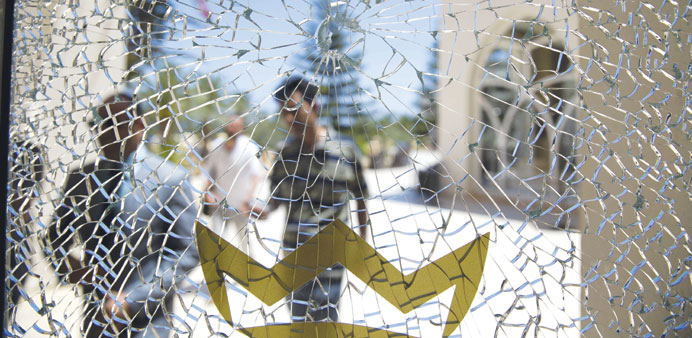A bullet hole on a window in the Riu Imperial Marhaba Hotel in Port el Kantaoui, on the outskirts of Sousse south of the capital Tunis where the deadly attack took place. Tourism accounts for about 7% of Tunisia’s economic output, according to the IMF, and is one of the country’s biggest foreign-currency earners. About 15% of Tunisia’s workforce is either directly or indirectly employed in tourism.
Bloomberg/Cairo
“Tunisia’s tourism is living through dark days,” said Massoud Riahi, who scratches out a living selling silver necklaces outside Tunisia’s Bardo museum.
Riahi’s income has plummeted since armed militants attacked the building in March, killing at least 22 people. Friday’s massacre at a Tunisian seaside resort will only make things tougher.
Riahi spoke from his perch outside the museum, housed in a 15th century palace in the capital city Tunis, two days after a gunman opened fire on tourists lounging on a beach in Sousse, killing at least 38.
While Tunisia has evaded the worst of the unrest that swept through Libya, Syria and Egypt since 2011, the violence is hurting an economy struggling to recover after the uprising that toppled President Zine El Abidine Ben Ali.
UK travel companies Thomson Airways and First Choice Holidays said on Saturday they are repatriating about 2,500 holidaymakers after the shooting. Tourism accounts for about 7% of Tunisia’s economic output, according to the International Monetary Fund, and is one of the country’s biggest foreign-currency earners.
“This tragedy is worse than the attack on Bardo,” Mohammed Ali Toumi, head of the Tunisian Federation of Travel Agencies, said by telephone. “Hotels may close their doors and hotel owners may go bankrupt. Around 700 travel agencies that employ 14,000 people will be affected by this terrorist attack.”
The massacre will complicate efforts to reduce income inequality and unemployment, among the reasons that led to Ben Ali’s ouster. Economic growth, which averaged 4.7% in the five years through 2010, slowed to 1.7% in the first three months this year, central bank data show.
About 15% of Tunisia’s workforce is either directly or indirectly employed in tourism, according to the IMF. Before the museum attack, Riahi said he used to make about 100 dinars ($51) a day selling necklaces. These days, sometimes he comes home with just five dinars.
“The terrorists understand the importance of tourism to the Tunisian economy, and they acted accordingly,” said Moez Joudi, an economist and president of the Tunisian Governance Association.
First-quarter tourist arrivals were already below their 2010 levels, Razan Nasser, senior Middle East and North Africa economist at HSBC Holdings, said by phone from Dubai. While the “downside is more limited,” as a result, “the recovery has now been dimmed, especially with having two consecutive attacks rather than a single isolated incident,” she said.
The revival of Tunisia’s economy has been a key element in efforts to foster stability, with officials looking to cut into an unemployment rate of 15% by luring foreign investors.
The “international investor confidence has been shaken,” Nasser said.
Tunisia’s $1bn Eurobonds due in 2025 fell after the shooting. The yield rose 15 basis points, the most since the securities were sold in January, to 5.81%, according to data compiled by Bloomberg.
Tunisia signed a loan accord with the IMF in 2013 for about $1.75bn, and has since been carrying out a number of economic measures, including consolidation of all tax provisions into a single code.
The IMF this year approved a seven-month extension of the agreement to give the government more time to undertake the necessary banking and fiscal reforms.
“It’s more difficult to enact reforms in a weaker growth environment,” Nasser said.

